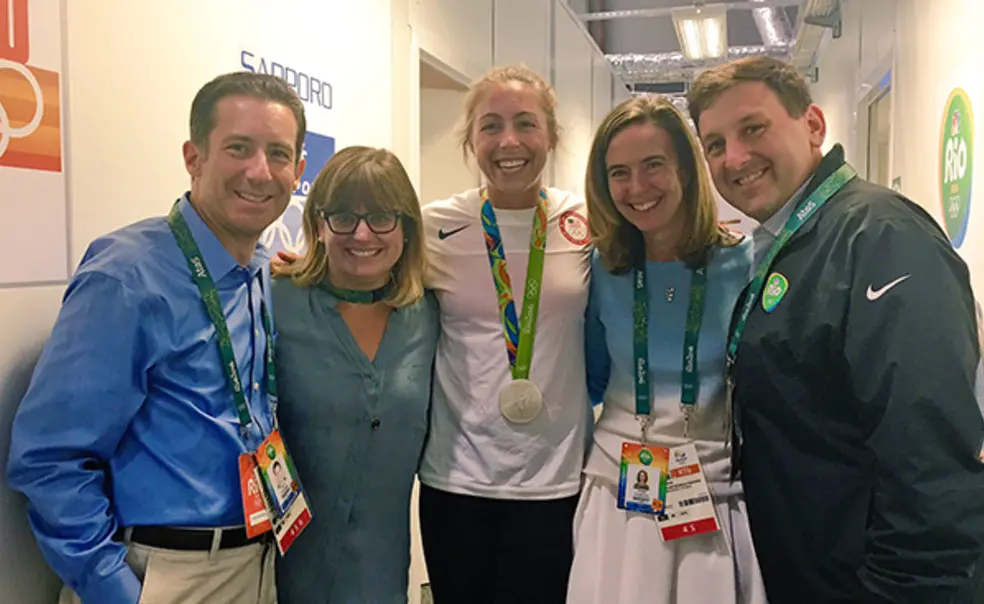Alumni Reunite on NBC’s Winter Olympics Team
The community of Olympics media professionals is tight, reuniting like clockwork every two years, sometimes for decades on end. And four members of this elite group, spearheading NBC’s Olympic operations, are Princeton alums who graduated within just a five-year span.
The four NBC veterans will be on the ground in Pyeongchang, South Korea, for the 2018 Winter Olympics, which begin with live coverage Feb. 8 (opening ceremonies are Feb. 9). They are Rebecca Chatman ’94, the vice president of NBC Olympics; Joe Gesue ’93, the senior vice president for NBC Olympics; Brett T. Goodman ’90, the general counsel for NBC Sports Group; and Jennie Thompson ’90, the senior director of NBC Olympics Marketing.
One way or another, these four Tigers’ career paths in sports began at Princeton. Gesue and Goodman covered sports as campus journalists — Gesue for the Daily Princetonian and Goodman for the Press Club and WPRB. Thompson was a golf team captain and history major who wrote her thesis on how Ohio State University helped transform football from a game to a national form of entertainment. While Chatman was a Romance languages and Latin American studies major, she said she always knew she wanted to work in sports television.
Goodman was the first of the foursome to land at NBC, as a researcher working on the 1992 Summer Olympics in Barcelona. “The next two years were amazing — my best job ever — as I traveled the world on someone else’s dime and met hundreds of fascinating people,” he recalled. After graduating from Columbia Law School and a stint in private practice, Goodman ended up back at NBC on its legal team, and has been there ever since.
Gesue and Thompson, meanwhile, began their Olympic careers for NBC in 1996, when the Summer Games were held in Atlanta. While each of the four alums has worked on other sports events — Super Bowls, World Series, NBA Finals, and PGA Tour events — the Olympics has been the cornerstone of their work, repeatedly drawing them back. Chatman joined the year-round Olympic staff at its inception in preparation for the 2000 and 2002 games.
“Every two years there’s a new opportunity to really get to know a nation’s culture and people and history and current circumstances,” Gesue said. “It’s an ongoing, real-time education.”
For Goodman, his work begins almost ridiculously far in advance. He’s handled three Olympics rights negotiations, the most recent of which, from 2014, extends all the way to the 2032 Games. Prior to each Olympics, he travels to the host country a few times to hire local counsel, to lobby local officials on tax, labor, and immigration issues, and to gauge potential legal risks for the NBC employees, who will number roughly 3,000 in South Korea. “It takes a village,” Goodman said.
Thompson, meanwhile, has already organized shoots in Los Angeles involving 100 medal hopefuls; over a five-day period, 20 athletes a day rotated through 20 stages for specific NBC units and affiliates. Thompson also helmed action shoots at sites as far flung as California’s Mammoth Mountain for skiers and snowboarders and Lake Placid, N.Y., for athletes in luge, skeleton and bobsled. Once the Games begin, Thompson and her team are responsible for picking up athletes at the venue where they compete, then spending the next day or more guiding them through the crush of media interviews.
“When we’re at the games, it’s 12 to 14 hour days every day for three weeks with no days off,” Thompson said.
Gesue and Chatman, for their part, work on the planning and execution of NBC’s Olympic production and content, including allocating the network’s staff at various venues, deciding which features to produce, and ensuring quality control and balance for the coverage. “Some of the sports are only viewed by a large, American audience every four years, so it’s important to find people who can explain everything from the rules to the nuances that go into a gold-medal performance,” Chatman said.
In Pyeongchang, NBC will produce about 2,400 hours of programming on television and digital platforms, and about 70 pre-produced features, documentaries, and cultural stories, Gesue said.
The Pyeongchang Games involve particular sensitivities — the Games, located just 50 miles from the demilitarized zone between North and South Korea, will be held amid a war of words between the United States and North Korea over the North’s nuclear tests. While the stakes are particularly high this year, geopolitical intrigue is hardly unprecedented in these international athletic spectacles. “By their nature, the Olympics will always reflect the geopolitics of the time,” Gesue said.
Even before the Pyeongchang Games start, the NBC team began looking ahead to future Olympics. “We’ve already begun planning for Tokyo in the summer of 2020,” Gesue said. “While we own all rights in the U.S., we are one of many stakeholders around the world, and dealing with a project this complex requires a lot of advance planning.”










No responses yet